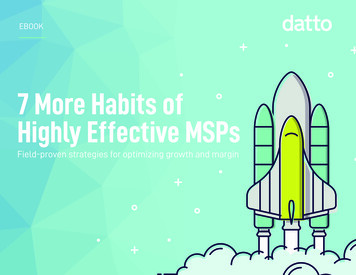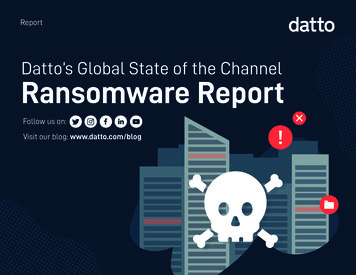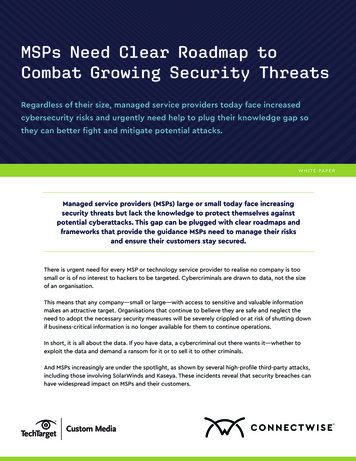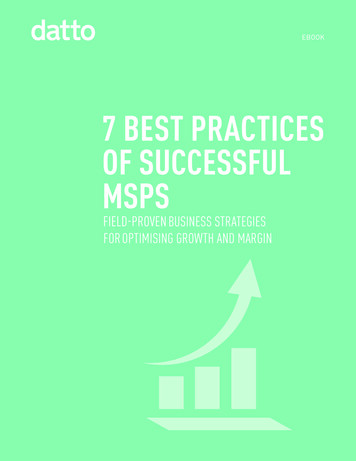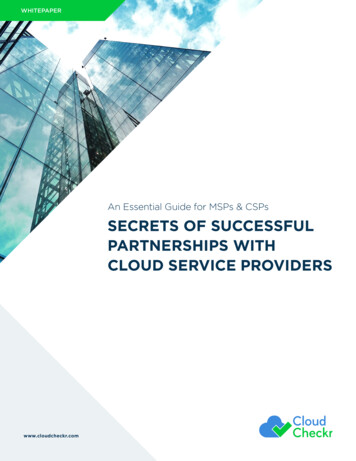
Transcription
WHITEPAPERAn Essential Guide for MSPs & CSPsSECRETS OF SUCCESSFULPARTNERSHIPS WITHCLOUD SERVICE PROVIDERSwww.cloudcheckr.com
“Customer demand for managed services is surging and cloudspending is expected to exceed 500 billion by 2020.”– MICROSOFT AZUREOVERVIEWThe cloud has entered a new era of mass enterprise adoption. Leading cloud providers, such asAWS, Microsoft Azure and Google Cloud Platform, are continually adding new features andservices designed to help organizations move their on-premise systems to their platform. They’rebuilding alliances with dominant forces in the on-premise world, such as virtualization softwarecompany VMware—in a bid to facilitate workload mobility and speed up the migration process. Atthe same time, each vendor’s ecosystem of partners and third-party solution providers is playing anincreasingly important role in attracting new customers to the cloud.This IT revolution is opening up a wealth of business opportunities for existing cloud MSPs andCSPs. And, likewise, it offers great potential to traditional managed service partners that areprepared to change and adapt to the new cloud landscape.Blazing the trail for the MSP, CSP and reseller sector are companies, such as Rackspace, Smartronixand CorpInfo, that are leading the field on the foundation of their cloud-based services and strongpartnerships with key players in the cloud infrastructure market.But what has made these partnerships so successful? What are the qualities that make suchcompanies consistently top tier Gartner Magic Quadrant resellers?In this guide, we uncover some of the secrets to successful partnering with a cloud servicesprovider. First, we look at the benefits of these partnerships. Next, we run through the typical stepsinvolved in becoming a partner. We then move onto the knowledge, skills and qualities you need tomake the grade as a cloud MSP or CSP and offer advice on how to stand out in a highly competitivemarketplace. Finally, we consider the tools you need to accomplish your goals.BENEFITS OF CLOUD VENDOR PARTNERSHIPSPartnering with cloud infrastructure providers offers a multitude of benefits that make it the perfectcatalyst for fueling your business growth.WHITE PAPER: Secrets of Successful Partnerships with Cloud Service Providers2
››Training and support: Partnership programs typically offer exclusive access to technical,marketing, and business resources, including best practice guides, workshops and exclusivewhitepapers, through which you can grow your business and better support your customers.››Accreditation: Industry-recognized credentials highlight your expertise and provide assuranceto customers that you are professional, stay informed of the latest industry developments, andfollow best practices.››More exposure: Partnership opens up new sources of business leads, such as a companyprofile and detailed landing page in the vendor’s partner directory. You’ll also become eligibleto sponsor and participate in vendor events across the world, raising your profile in the globalcloud community.››More recognition: Authorized use of official partner logos will help you attract more prestigiouscustomers and more lucrative contracts.››Consistent revenue stream: Partnering can help shape the direction of your business,transforming it into a fully fledged monthly subscription service and providing a more consistentrevenue model.››A leading edge: Partners receive regular information about the latest vendor innovations,product releases and service updates—often significantly before they reach the wider publicdomain. This means participating MSPs and CSPs can stay ahead of the curve and be moreresponsive to changes by developing new solutions for their customers ahead of time.Through direct access to first-hand knowledge and expertise that your cloud vendor is able toprovide, you can offer your customers a higher standard of service. For example, they can besure of informed advice on migrating to the cloud and getting the best out of their infrastructure.They’ll benefit from up-to-date guidance on the latest cloud technologies. And they’ll also getbetter ongoing operational support, helping them to stay up to date with the latest OS patches andapplication updates.Nevertheless, the most important benefits of using a managed service partner remain the same—your organization takes care of running your customers’ day-to-day IT, freeing them up to focus onwhat they do best. And because their operational management is covered by one simple monthlybill, an MSP or CSP makes it easier for them to plan and budget costs.HOW TO BECOME A PARTNEROnce your organization has decided to team up with a cloud provider, your next step is to begin thevendor’s process of becoming a partner. However, before you can attain partner status, you need tocomplete the vendor’s prerequisite program first.WHITE PAPER: Secrets of Successful Partnerships with Cloud Service Providers3
PREREQUISITE PARTNER PROGRAMSAPN Consulting PartnerCloud Solution Provider (CSP)Service PartnerThe full route to becoming a qualified MSP or CSP partner varies from provider to provider, andno two journeys are the same. But, as a general guide, the steps you’ll need to take are typically asfollows:››Get training and certification: As a prospective partner, you’re required to follow a learningplan to build up your baseline knowledge and skills. This usually necessitates a combination ofboth business and technical accreditation, which shows you’re able to offer a balanced set ofcompetencies to your customers.››Build a customer base: It’s equally important to gain hands-on experience of helping customersuse the platform. So cloud vendors also expect you to onboard new clients to their servicesthroughout the process. This demonstrates both your business credibility and technicalproficiency, as you put the training and knowledge you’ve gained into practice.››Validate your capabilities: Cloud vendors also require an independent audit to verify yourbusiness meets their strict criteria for becoming a qualified MSP or CSP. This not only assessesyour technical capabilities in areas such as migration, security, and system architecture, but alsoyour business as a whole, including financial health, customer service and succession planning.››Submit your application: First, you’ll need to make sure you’ve satisfied all vendorrequirements. These will include a minimum number of certifications and successfully passingthe auditing process. You’ll also need evidence that your customers are using the vendor’sservices. This usually means meeting a minimum level of sales generated—either in terms ofrevenue or number of accounts sold and deployed.The vendor validation process, in particular, underlines why you need so much more than simplystrong technical expertise to become a partner. For example, it’s wise to create a business plan, aprocess for staff recruitment and development, a marketing strategy and different pricing tiers withwell-defined SLAs.You should also plan ahead and consider the tooling you’ll need to manage your customer base atscale. As market-leading cloud providers, AWS, Azure, and Google offer a comprehensive range ofin-house and third-party services that solve the specific problems cloud MSPs and CSPs encounter.WHITE PAPER: Secrets of Successful Partnerships with Cloud Service Providers4
FOUNDATION›› Basic IT operationsmanagement (Patchingconfiguration, etc.)›› 24/7 monitoring›› Monthly health reports &dashboard›› 24/7 help deskADVANCEDPREMIER›› Advanced level IToperations managementincluding performancemonitoring›› Advanced level IToperations managementincluding performancemonitoring›› 24/7 monitoring andalerting›› 24/7 monitoring andalerting›› Daily health reports &dashboards›› Custom real-time healthreports & dashboards›› 24/7 help desk withaggressive response SLAs›› Backup and DR withrecover/failover SLAs›› 24/7 help desk withaggressive response SLAs›› Billing management andcost optimization›› Dedicated accountmanagementIllustrative Example of CSP Pricing Tiers. Source: Microsoft Azure“The AWS Managed Service Provider program is designed forAPN Consulting Partners who are skilled at cloud infrastructureand application migration, and deliver value to customers byoffering proactive monitoring, automation, and management oftheir customer’s environment.”AMAZON WEB SERVICESQUALITIES OF A SUCCESSFUL CLOUD PARTNERManaging services in the cloud presents a different set of challenges from traditional IT, requiringknowledge and skills in unfamiliar technologies, adoption of new practices, and a strategic shiftin your approach to business. The following is a more detailed breakdown of the qualities cloudvendors look for in the approval process for their partner networks.WHITE PAPER: Secrets of Successful Partnerships with Cloud Service Providers5
Cloud vendor expertise: MSPs and CSPs must have a high level of expertise in the vendor’s rangeof products and features. This goes a long way in helping customers get the best value out of theircloud—through the right choices of services to suit their individual needs.››Migration: You should have strong migration capabilities, both in terms of expertise and tooling,so you can deliver a smooth transition and provide customers with infrastructure that’s alignedto best practices. You’ll need to provide objective advice on the different methods of migration,highlighting the pros and cons in relation to cost, security and performance. To help customersmake an informed decision, you should provide a proof of concept (POC) and a migrationroadmap to guide them through the process.››Inventory management: The cloud is a highly dynamic IT environment where customers arecontinually spinning up and closing down instances. So, in order to maintain effective costmanagement and security, it’s essential you know what cloud resources they’re running at anygiven time. The other issue you face is the sheer complexity of the infrastructure you needto manage, leaving you with no alternative but to use sophisticated cloud monitoring toolsdesigned with this purpose in mind.››Security: Cloud MSPs and CSPs also need systems and tools for managing security atscale. Moreover, to further streamline your processes, you should adopt a universal securityframework that covers all your customers’ individual requirements simultaneously. This willhelp rationalize the process of onboarding new customers and minimize the scope for securityoversights.››Cost control: One of your key responsibilities as a reseller is to help keep your customers’ cloudcosts down. Therefore you need to ensure they have clear visibility into their infrastructureusage and control over their costs. They should be able to quickly identify and clean up unusedand underutilized resources. They also need a way of identifying and exploiting cost-savingopportunities. With the right cost management tools, you can keep a watchful eye over allyour customer accounts while giving them the autonomy to make their own cost optimizationdecisions.››DevOps pipelines and infrastructure management: Cloud vendors look favorably onMSPs and CSPs that understand the value of robust infrastructure and application lifecyclemanagement. So you’ll need to demonstrate expertise in implementing DevOps practices, suchas Infrastructure as Code (IAC), and Continuous Integration (CI) and Continuous Delivery (CD)pipelines, along with a track record of maintaining consistent, stable and secure environments.››Account and billing management: You’ll need a deep understanding of the cloud vendor’sbilling system as well as federal tax laws and rates. You’ll also need to interpret complex cloudbills and have a clear and consistent system in place to allocate costs, discounts, and markups.Some cloud management platforms provide a billing administration feature that streamlines theprocess of dealing with a multitude of customer accounts.WHITE PAPER: Secrets of Successful Partnerships with Cloud Service Providers6
››Customer service: Substandard service not only affects your relationship with your customers,but could also put the partner cloud vendor’s reputation at stake. You should put customerexperience at the center of all your business processes—from monitoring and continuouscompliance to helpdesk support and incident response.Viable and scalable business model: Cloud vendors want partners they can rely on. So they look forfinancially healthy MSPs that will be around to serve their customers long into the future. What’smore, they want forward-looking businesses that build in future growth and can handle everydayoperational responsibilities, such as change, security and patch management, at scale. You can learn more about how to grow your cloud-based business byreading our eBook, which covers in detail the challenges MSPs and CSPsface when scaling their services.STANDING OUT FROM THE COMPETITIONPartnering with a cloud vendor will work wonders for raising your organization’s profile andboosting professional credibility. But you’ll still need to remind prospective customers why theyshould buy from you rather than your competitors.One of the best ways to differentiate yourself as a cloud partner is to target a niche service. Forexample, many MSPs focus on migration. However, it’s important to remember that customers stillneed help to succeed in the cloud once they’ve migrated.You could consider targeting very specific customer needs, such as security and compliance,application development, backup, hybrid clouds and cost optimization expertise. You could alsofocus on technologies that intersect with the cloud, such as DevOps, machine learning and bigdata. Alternatively, you could specialize in specific industry verticals or particular types of workload,such as mobile apps or eCommerce.And ask yourself whether your business provides any value-added services. For example, do youoffer a new and unique SLA? Do you offer custom cloud features and services that other partnerscannot provide?Many businesses are reluctant to specialize, as they think it limits their options. But, if anything,the opposite is true. In the case of the cloud, as elsewhere, different customers face differentchallenges. And if you specialize in solving their particular problems, you position yourself as theobvious choice of cloud reseller.Nevertheless, you’ll still need to balance your specialist skills with a broader coverage of technologiesand tools, as this generally makes you a more appealing partner to cloud infrastructure providers.WHITE PAPER: Secrets of Successful Partnerships with Cloud Service Providers7
Conducting market research or surveying existing customers arepotential tactics to help uncover your organization’s key differentiators.This can uncover invaluable information about customer pain points todevelop services and capabilities as you scale.“Our research shows partners use, on average, 13 different toolsto deliver cloud-based managed services. Some MSPs manageas many as 30 vendor relationships — including tools used fortheir on-premises management needs.”– MICROSOFT AZUREThe Right Tools Make a DifferenceWhatever direction you take on your partnership journey, cloud management tools will play apivotal role in your business growth and success.They’ll take the strain of managing complex infrastructure as you expand your customer base.What’s more, with the right tools, you can stay on top of the everyday financials of managing yourclient portfolio—from creating custom price books and invoices to cost allocation.They’ll save you time. They’ll save you money. And they’ll also help you provide a better service toyour customers. In other words, you can maintain a highly efficient and profitable operation while atthe same time offering outstanding value for money.Need CloudCheckr for yourorganization? Learn more atwww.cloudcheckr.com.342 N GOODMAN ST,ROCHESTER, NY 146071-833-CLDCHCKwww.cloudcheckr.com
WHITE PAPER: Secrets of Successful Partnerships with Cloud Service Providers 3 › Training and support: Partnership programs typically offer exclusive access to technical, marketing, and business resources, including best practice guides, workshops and exclusive whitepapers, through which you can grow your business and better support your customers.

